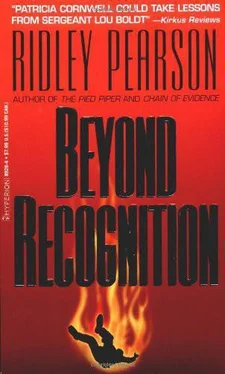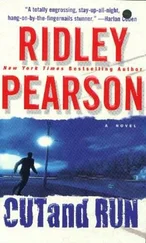Ridley Pearson - Beyond Recognition
Здесь есть возможность читать онлайн «Ridley Pearson - Beyond Recognition» весь текст электронной книги совершенно бесплатно (целиком полную версию без сокращений). В некоторых случаях можно слушать аудио, скачать через торрент в формате fb2 и присутствует краткое содержание. Жанр: Триллер, на английском языке. Описание произведения, (предисловие) а так же отзывы посетителей доступны на портале библиотеки ЛибКат.
- Название:Beyond Recognition
- Автор:
- Жанр:
- Год:неизвестен
- ISBN:нет данных
- Рейтинг книги:5 / 5. Голосов: 1
-
Избранное:Добавить в избранное
- Отзывы:
-
Ваша оценка:
- 100
- 1
- 2
- 3
- 4
- 5
Beyond Recognition: краткое содержание, описание и аннотация
Предлагаем к чтению аннотацию, описание, краткое содержание или предисловие (зависит от того, что написал сам автор книги «Beyond Recognition»). Если вы не нашли необходимую информацию о книге — напишите в комментариях, мы постараемся отыскать её.
Beyond Recognition — читать онлайн бесплатно полную книгу (весь текст) целиком
Ниже представлен текст книги, разбитый по страницам. Система сохранения места последней прочитанной страницы, позволяет с удобством читать онлайн бесплатно книгу «Beyond Recognition», без необходимости каждый раз заново искать на чём Вы остановились. Поставьте закладку, и сможете в любой момент перейти на страницу, на которой закончили чтение.
Интервал:
Закладка:
“I don’t see my attorney,” he said, as Boldt and Daphne stepped through the cell door and it was closed behind them. LaMoia remained on the other side of the bars, holding them and pressing his face close between the coldness of their steel. “I’ve got nothing to say without my attorney present,” Garman added.
Daphne and Boldt sat down on the bunk opposite. By agreement, no one spoke. Daphne would be the first to break the silence. They would take turns after that; it was arranged.
They remained perfectly still for the better part of five minutes, Garman looking between them and over at LaMoia as well. As the minutes passed, the arrested man looked increasingly nervous. He finally said, “You’d think they would paint the walls, get rid of the graffiti every now and then. It’s offensive stuff.”
She said, “We can’t match a single letter in any of the notes with your handwriting.”
Boldt told him, “The individual committing these arsons weighs sixty pounds less than you do.”
LaMoia chimed in. “All the quotes used in the threats are collected in a single source. Maybe you might enlighten us as to what that source is.”
Garman’s eyes continued to tick between them.
LaMoia said, “What is the common source to these quotations you mailed yourself?”
Garman blurted out “Bartlett’s,” with some authority.
LaMoia made the sound of a game-show buzzer, indicating error.
Garman appeared shaken by his mistake.
Daphne said, “The lab has identified the chemical composition of the ink used in the threats. You don’t own a pen that comes close. You don’t own the paper. We could only find three stamps in your place, and they aren’t the kind the Scholar uses.” She studied the man’s eye movements and body language. She watched for a busy tongue or other indications of a dry mouth.
“You never reported your pickup truck stolen,” Boldt said.
LaMoia added, “You never applied for the insurance money. How is it you lose a seven-thousand-dollar pickup truck and don’t apply for insurance?”
“Curious,” Daphne said.
A sheen of perspiration glowed on the skin knitted beneath Garman’s eyes. He rubbed his index finger against his thumb so tightly that it sounded like crickets chirping.
“My attorney,” he mumbled.
“We’ve called him. We’ve notified him. He’ll be here,” Boldt informed the man. It was the truth. What Garman apparently did not know was that his attorney was, at that moment, in court. It would be hours before he made it down to lockup.
“Tell us about the fire,” Boldt said, intentionally ambiguous.
“Which fire?” Garman asked, finding room for a slight smile. “I’ve seen a few.”
“But how many have you started?” LaMoia asked.
“Nick Hall sold me the hypergolics,” Garman began, repeating his radio performance. “I knew about their destructive power from my work at Grand Forks.”
“The North Dakota Air Force base,” Daphne said. “Your service record shows you as fire suppression, some demolition work.”
“That’s right. It was dangerous work.”
Boldt began to enjoy the process. Little by little, Garman was talking more than he intended. Coming apart. Little by little, they were zeroing in on the questions they wanted answered. Daphne had devised the order of questioning. “Tell us about the fire,” the sergeant said.
Garman’s eyes flashed between the three.
“The trailer,” LaMoia said. “Your trailer. It burned to the ground, burned down to nothing, according to the reports. Listed as accidental. But Fidler-you know Sidney Fidler-spoke to a couple of folks who remembered that burn quite well. It was extremely unusual in that the water hoses appeared to add fuel to the fire. The thing just got hotter and hotter. That’s hypergolic rocket fuel, Garman, the same thing we’re seeing here. You understand our curiosity.”
This time it was footsteps down the hall, not Garman’s nervous fingers. A guard approached, signaled Boldt, and passed a piece of paper through the bars. Another trick of Daphne’s. Bahan had come through with the name of Garman’s son only moments before the questioning. He had pulled it off of medical insurance records that painted an ugly picture. She had decided some theatrics wouldn’t hurt any. There was nothing written on the piece of paper passed to Boldt, but he read it with great interest. He looked up from the note with wide, expressive eyes of pure shock.
Garman leaned a little forward with expectation.
But Daphne spoke, not Boldt. “Was Diana unfaithful? Was that it?”
The suspect’s jaw slacked open, and his cheeks lost their color. For a moment he didn’t breathe, didn’t move. He said vehemently, “You don’t know anything about it.”
She glanced at Boldt and offered him a faint nod, though Garman’s comment churned in the pit of her stomach.
Boldt said softly, “Jonathan Carlyle Garman. He was admitted to the hospital on the Grand Forks base, June 14, 1983. Third-degree burns to the face and upper body. Seven months of reconstructive surgery followed.”
“When was the last time you saw him?” LaMoia asked.
Daphne pleaded, “Tell me it was Diana you meant to harm. Tell me you didn’t mean for the boy to be hurt.”
“Mother of God!” the suspect said, hanging his head into his huge hands, his back shaking violently as he cried.
Daphne took the opportunity to glance over at Boldt. She nodded. But she, unlike LaMoia, was not proud of their accomplishment. A contagious sadness surrounded her and infected Boldt.
Through his sobs the suspect said into his hands, “She took him with her. Kidnapped him. And not out of love, but because of the things he knew, because of the things she had done to him…. What kind of woman is that?” He pulled up from his hands and looked Daphne directly in the eye.
“We’re not here to judge you,” she whispered. “Only to find out the truth. To help Jonathan. It’s the boy who needs our help.”
Garman sobbed for five of the longest minutes in Boldt’s life. Would he cooperate or demand an attorney? The minutes ticked by, the evening drawing ever closer and the promise of another arson along with it. Another victim.
The phone company had no record of a Jonathan Garman; there was no driver’s license or vehicle registration in Motor Vehicle’s database. Other sources were being checked, but it appeared that the arsonist either existed outside of the paper shuffle or within an alias.
“I never meant it the way it happened,” Garman finally gasped. “She had been selling herself. Made the boy a part of it.”
Boldt released a huge sigh and sat back on the bunk. Sometimes he hated the truth.
The footsteps suddenly coming down the hall were not part of the plan, and all three police officers looked in that direction as they drew ever closer, wondering what in the world they could possibly mean. The guard handed Boldt a second message.
Boldt looked up from this second note. “It’s a car wash,” he said.
The building momentum that captured Boldt’s investigation had exercised its influence on Bernie Lofgrin’s identification technicians. In the same afternoon, the lab techs determined that the blue and silver cotton fiber evidence collected from the insides of the windshields on the cars of two of the arson victims matched, not only one to the other but to the fibers found on Boldt’s kitchen window and those collected at the base of the ladder at the Enwright fire. It was just such evidence that gave a lock on a case, and as Lofgrin was pursuing Boldt to give him the good news, his assistants were tracing the sale of that particular silver ink to a total of only five silk-screen printers in the Northwest.
Читать дальшеИнтервал:
Закладка:
Похожие книги на «Beyond Recognition»
Представляем Вашему вниманию похожие книги на «Beyond Recognition» списком для выбора. Мы отобрали схожую по названию и смыслу литературу в надежде предоставить читателям больше вариантов отыскать новые, интересные, ещё непрочитанные произведения.
Обсуждение, отзывы о книге «Beyond Recognition» и просто собственные мнения читателей. Оставьте ваши комментарии, напишите, что Вы думаете о произведении, его смысле или главных героях. Укажите что конкретно понравилось, а что нет, и почему Вы так считаете.












